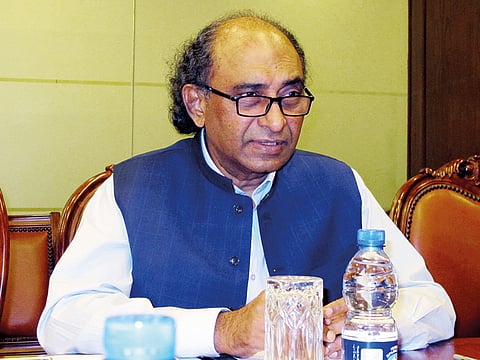Pakistan works on changes to woo investors
Measures to fight corruption and lure investors from abroad are in the pipeline, officials say

Karachi: Pakistan, under the new government of Prime Minister Imran Khan, is working to attract foreign investments by establishing a one-stop shop that handles investors’ paperwork, officials say.
Also in the pipeline are steps to protect the business interests of foreign investors in the country.
A myriad of opportunities exist in the country for foreign investors, including in industry, textiles and hotels, experts say.
Pakistan’s government is working to meet two major requirements for foreign investments: protection of investments and facilitating ease of doing business, said Syed Hassan Raza, Additional Foreign Secretary for the Middle East at the Ministry of Foreign Affairs in Islamabad.
“We do have really good laws in this country, which we extend protections to any investor who comes to Pakistan,” he said. “The element of facilitation is very important, because in many places, where the foreign investor would look [investor] would like to see that his investment could go in the local economy that in such a way that he does not’ have to face the red tape,” he said.
“In this context, the PM himself, has announced that there is going to be a body that is going to work directly under the supervision of the PM’s office, which is going to make one window-operation for all the investors who are going to come to Pakistan. So then comes the areas in which investments could be made,” he said.
Raza added that Khan was working “on institutionalising” the reforms and reviving the institutions of the country.
He also promised to eradicate corruption from every institution and at all levels, officials said.
“This is one of his goals, that corruption should be eliminated from the society, not only any particular institution that is dealing with investments, but also every institution,” while the entity that is responsible for interacting with international entrepreneurs would “work directly under his supervision”.
Other officials, meanwhile, extend invitations for foreign investors to visit the country to explore available opportunities.
“I would like to invite the businessmen from UAE and the Gulf region to come and visit Pakistan [to] have a look [and] study what our plans are,” said Imran Ismael, governor of Sindh, in a recent interview in his office in Sindh’s capital, Karachi, with a visiting media team from UAE. “We can provide them with one window-operation and we can facilitate them in every manner we can.”
Sindh, located in the southeast of the country, is one of the four provinces of Pakistan. It enjoys a special place for the country’s economy.
While it is the third largest province of Pakistan by area and second largest province by population after Punjab, its contribution to the economy is the highest, with nearly half of the income generated from the province capital: Karachi, officials said.
Pakistan, a few decades ago, was a cosmopolitan destination for rich people and executives from many Arab countries, namely the Gulf region.
However, it lost its sparkle because of corruption and internal conflicts. As a result, Karachi, which contributed a considerable chunk of the Pakistani economy in the past, estimated by some officials at more than 50 per cent, was “ignored for 30 years”, Ismael said.
However, today, the security situation has improved in the city, which is considered the financial and economic hub in the country. Karachi is the largest Pakistani city with a population of 16 million: one third of the Sindh’s population and one-fifth of the country’s urban population.
“We want them to come back for business and holidays,” said Ismael of UAE businessmen and executives.
According to a recent World Bank report, the coastal city of Karachi generates 12-15 per cent of Pakistan’s GDP, and is the centre of manufacturing employing in the country. It succeeded in reducing the percentage of its poor population from 23 per cent in 2004-2005 to 9 per cent in 201-2015.
Presently, the city needs nearly US$9 to US$12 billion (between Dh33 billion to Dh44 billion) to develop its infrastructure and services needs in urban transport, water supply, sanitation and municipal solid waste, according to the report.
Pakistan’s government has its own plans to develop the city, mainly in the fields of improving cleaning the city and improving the garbage collecting in it, developing the sewage system and having more desalination water projects. Governor Ismael says the initial estimate of those plans are around 500 billion Pakistani rupees (Dh15 billion)
Apart from the improving the security and economic environment, Ismael said the city’s strengths included the port, ample land that can be utilised for foreign investments, oil refineries and lucrative famous textile sector.
Already, the city exports textiles, leather goods, dairy food products and electronics made in Pakistan.
“Give us 100 days and the government’s plan will be crystal clear,” he said of Imran Khan’s government, which took office nearly three weeks ago.
Public hopes are high from Khan’ government, which has already formed 15 task forces on different issues, including the economic and financial.
The Asian country, which sought the assistance of the IMF several years ago to handle its financial troubles, is still facing economic woes.
“We need 12 billion rupees a month to meet the financial deficit. That is about 2 billion dollars a month. So this is not a small amount of money to manage,” said Pakistani minister of Information Fawad Hussain Chaudhry. One of the main decisions to be taken by the government is the future relations with the IMF, and the incentives for 7.6 million expatriates to help their country’s economy.
Sign up for the Daily Briefing
Get the latest news and updates straight to your inbox


